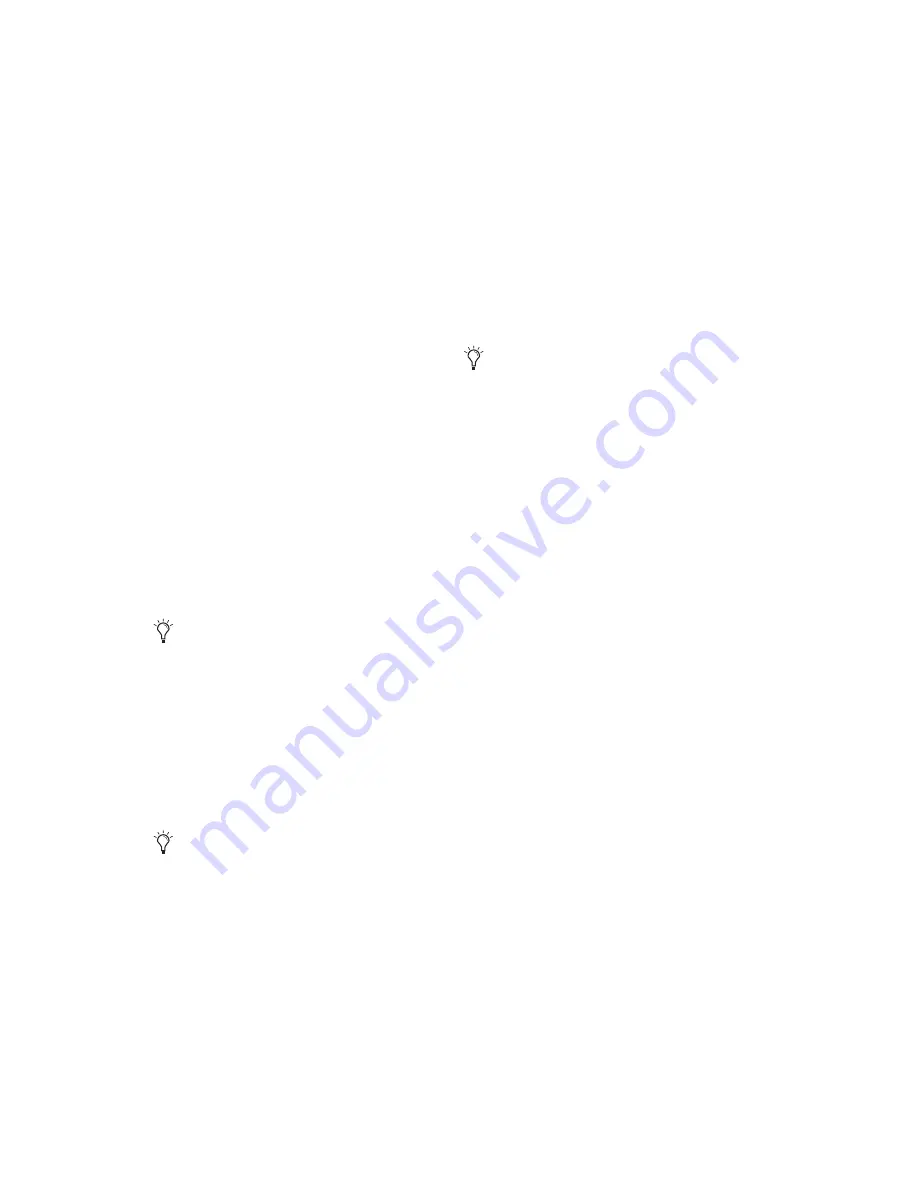
Pro Tools Reference Guide
682
Editing Parameters Using a Mouse
You can adjust rotary controls by dragging hori-
zontally or vertically. Parameter values increase
as you drag upward or to the right, and decrease
as you drag downward or to the left.
Keyboard Shortcuts
◆
For finer adjustments, Control-drag (Win-
dows) or Command-drag (Mac) the control.
◆
To return a control to its default value, Alt-
click (Windows) or Option-click (Mac) the con-
trol.
Editing Parameters Using a Computer
Keyboard
You can use your computer keyboard to edit
plug-in controls.
If multiple Plug-in windows are open, Tab and
keyboard entry remain focused on the plug-in
that is the target window.
To change control values with a computer
keyboard:
1
Click or Navigate to the control text field that
you want to edit to activate the field.
2
Change the value by doing one of the follow-
ing.
• To increase a value, press the Up Arrow on
your keyboard.
• To decrease a value, press the Down Arrow
on your keyboard.
• Type the value.
3
Do one of the following to confirm the value:
• Press Enter on the numeric keyboard to in-
put the value and remain in keyboard edit-
ing mode.
– or –
• Press Enter on the alpha keyboard (Win-
dows) or Return (Mac) to enter the value
and leave keyboard editing mode.
To clear plug-in clipping
■
Press Alt-C (Windows) or Option-C (Mac).
Plug-in Automation and Safe
All real-time plug-ins can be fully automated,
and support all Pro Tools Automation modes
(Write, Touch, and Latch, plus Trim).
The Auto button opens the Plug-in Automation
dialog, where you can enable individual plug-in
controls for automation recording. (See “Auto-
mating Plug-ins” on page 703 for more informa-
tion.)
The Safe button engages Automation Safe mode.
When enabled, existing plug-in automation is
protected from being overwritten. (See “Record
Safing Plug-in Automation” on page 704.)
The plug-in target window is the focus of
keyboard shortcuts for plug-in settings. To
make a plug-in the target for any computer
keyboard commands (including key short-
cuts), click the plug-in’s Target button in its
Plug-in window.
To move forward through the different con-
trol fields, press the Tab key. To move back-
ward, press Shift+Tab.
In fields that support values in kilohertz,
typing “k” after a number value will multi-
ply the value by 1,000. For example, type
“8k” to enter a value of 8,000.
Summary of Contents for Pro Tools
Page 1: ...Pro Tools Reference Guide Version 7 3 ...
Page 15: ...1 Part I Introduction ...
Page 16: ...2 ...
Page 33: ...19 Part II System Configuration ...
Page 34: ...20 ...
Page 44: ...Pro Tools Reference Guide 30 ...
Page 94: ...Pro Tools Reference Guide 80 ...
Page 95: ...81 Part III Sessions Tracks ...
Page 96: ...82 ...
Page 108: ...Pro Tools Reference Guide 94 ...
Page 130: ...Pro Tools Reference Guide 116 ...
Page 269: ...255 Part IV Recording ...
Page 270: ...256 ...
Page 310: ...Pro Tools Reference Guide 296 ...
Page 345: ...331 Part V Editing ...
Page 346: ...332 ...
Page 402: ...Pro Tools Reference Guide 388 ...
Page 496: ...Pro Tools Reference Guide 482 ...
Page 548: ...Pro Tools Reference Guide 534 ...
Page 571: ...557 Part VI MIDI Editing ...
Page 572: ...558 ...
Page 596: ...Pro Tools Reference Guide 582 ...
Page 637: ...623 Part VII Mixing ...
Page 638: ...624 ...
Page 702: ...Pro Tools Reference Guide 688 ...
Page 771: ...757 Part VIII Video Sync Surround ...
Page 772: ...758 ...
Page 792: ...Pro Tools Reference Guide 778 ...
Page 806: ...Pro Tools Reference Guide 792 ...
Page 856: ...Pro Tools Reference Guide 842 ...






























